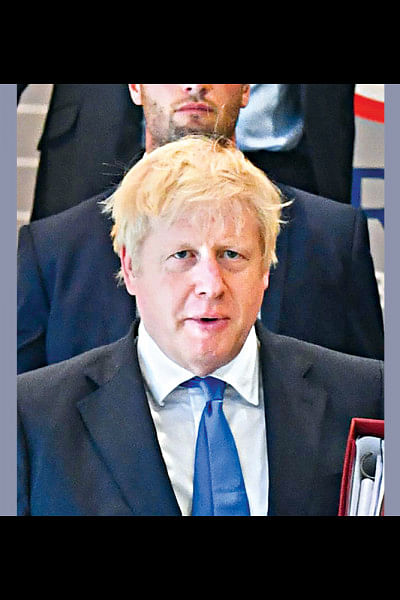British PM to suspend parliament till mid-Oct

Prime Minister Boris Johnson will suspend Britain’s parliament for more than a month before Brexit, enraging opponents and raising the stakes in the country’s most serious political crisis in decades.
Cheered on by US President Donald Trump, Johnson launched his boldest move yet to take the country out of the European Union by October 31 with or without a divorce deal, by setting a new date for a state opening of parliament.
Known as the Queen’s Speech, the formal event will be held on October 14 and be preceded by a suspension of the House of Commons, meaning parliament will not sit between mid-September and mid-October
The move, which had to be approved by Queen Elizabeth, limits the time opponents have to derail a disorderly Brexit, but also increases the chance that Johnson could face a vote of no-confidence in his government, and possibly an election.
It also risks dragging the 93-year-old, politically neutral queen into the dispute. So incensed were leaders of the opposition parties by Johnson’s plan that several have written to the monarch asking for a meeting to express their concern.
The queen acts on the advice of her prime minister and is not expected to take an active role herself. Her speech at the opening of parliament is written by the government, outlining its plans for legislation. Her office declined to comment.
“There will be ample time in parliament for MPs [members of parliament] to debate the EU, to debate Brexit and all the other issues, ample time,” Johnson told reporters.
Asked if he was trying to block MPs from delaying Britain’s EU departure, he replied: “That is completely untrue.”
While suspending parliament ahead of a Queen’s Speech is the historical norm in Britain, the decision to limit parliamentary scrutiny weeks before the country’s most contentious policy decision in decades prompted an immediate outcry.
“Make no mistake, this is a very British coup,” John McDonnell, the second most powerful man in the opposition Labour Party, said. More than half a million people signed an online petition to object and the pound fell sharply.
The Church of England warned a chaotic Brexit would hurt the poor, the speaker of parliament said the move marked a “constitutional outrage” and a group of cross-party lawmakers sought a legal injunction.
But Johnson’s gamble was welcomed by Brexiteers, including Trump, an early backer of Britain’s departure from the EU, who said “Boris is exactly what the U.K. has been looking for, & will prove to be ‘a great one!’ Love U.K.”
A spokeswoman for the European Commission, when asked about the British suspension of parliament, said it was a matter for the UK to answer.
UNCHARTED TERRITORY
More than three years after the United Kingdom voted 52% to 48% to quit the European Union, it is still unclear on what terms - or indeed whether - the bloc’s second largest economy will leave the club it joined in 1973.
With just 65 days until exit day, parliamentarians are battling to prevent the prime minister from steering the country out of the EU without a transition deal, pitching one of Europe’s most stable countries into uncharted territory.
On Tuesday, the leaders of Britain’s opposition parties had agreed to seek to use parliamentary procedure to force Johnson to ask Brussels for a delay to Brexit beyond Oct 31. But with the prime minister finally showing his hand, they may try to bring him down instead.
Labour leader Jeremy Corbyn said he would seek to use parliamentary mechanisms and then call a no-confidence vote when the time was right.
With Johnson holding a working majority of just one seat in the 650-seat parliament, members of his party who oppose a no-deal Brexit will have to decide where their loyalties lie.
The pro-EU Conservative Party lawmaker Dominic Grieve said he would find it difficult to “keep confidence in the government” in the circumstances while Philip Hammond, a former finance minister, said opponents would have to accelerate their plans to block a damaging EU exit.
In a sign of the pressures building across the political system, media reports said Ruth Davidson, the popular leader of the Conservatives in Scotland, was on the verge of quitting. She does not sit in the Westminster parliament.
Parliament’s speaker John Bercow, a powerful figure who has shown a willingness to break procedural precedents in order to ensure lawmakers can debate Brexit fully, said it was “blindingly obvious” the move was designed to restrict debate.

 For all latest news, follow The Daily Star's Google News channel.
For all latest news, follow The Daily Star's Google News channel. 



Comments